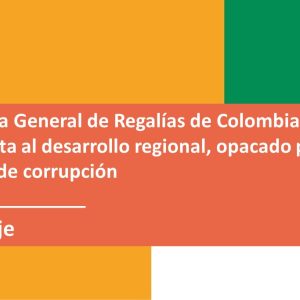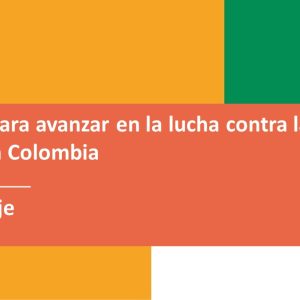Illegal mining in Colombia crosses and violates all kinds of borders, from geographic, human rights of the communities living in the territories where these natural resources are exploited, to environmental, social and economic ones.
Different types of mining converge on the mining map in Colombia, such as those that are governed by a legal framework, as in the case of mining. formal o legal which meets the different requirements of Colombian law for the exploitation of natural resources and generally occurs on a large scale; and artisanal o ancestralThe activity carried out traditionally and using little technology and machinery, on a small scale.
On the other hand, there is mining that is not legal, also known as informal or illegal mining.The mining that is carried out without a duly registered mining title, but without the involvement of illegal actors, as well as mining that has illegal armed actors behind it and that is related to other crimes such as drug trafficking or money laundering. However, the State, organizations and other actors generally do not differentiate between informal mining and mining promoted by criminal groups.
According to a 2022 report by the Comptroller General’s Office, illegal mining is destroying Colombia’s rivers, and about 85 percent of the gold exported by the country is the product of this activity.
Transparencia por Colombia explains on its website: “Illegal mining is one of the main causes of deforestation and environmental contamination in Colombia. To start illegal mining operations it is necessary to raze large areas of forest, leaving much of the biodiversity without habitat”.
Other forms of mining affected by criminality
The environment is not the only one affected by this activity, which is mainly focused on gold mining, although other metals such as platinum and silver are also mined.
Esteban Martínez, of the Colombian Mining Dialogue Group (GDIAM), assures that, in the midst of the struggle to put an end to this type of activity, artisanal, formal and informal miners have been stigmatized by society, the public forces and the media, in addition to being extorted and abused by the criminal groups and structures behind illegal mining.
Clear legislation
Martínez stresses that in order to put an end to mining promoted by criminal groups, there must first be legal clarity: “The big problem starts because in Colombia there is no differentiated regulation, we must distinguish the actors and the different types of mining, so as not to confuse legal, artisanal, informal miners with criminals,” he mentions, and adds that the first step to start winning that fight against mining promoted by illegal groups, beyond detonating yellow machinery, is to have clear rules and protect the other types of miners; in addition to a strong presence of all state actors, not only army or police, also educational offerings, productive alternatives, among others.
In addition to this proposal, Isabel Blandón Jaramillo, executive director of Fundación Atabaque, believes that another challenge to reduce or counteract this type of mining is the correct implementation of the Peace Agreements, which would also include a high institutional presence of the State, and where economic reincorporation is involved in regions where mining activities are the economic base, taking into account that in most of these areas there is a high presence of illicit crops, such as coca.
Departments such as Antioquia, Chocó, Bolívar, Córdoba and Amazonas are the main ones affected by mining financed by criminal groups, specifically gold mining, according to the report. Alluvial gold mining. Evidence from remote sensing 2020′. presented by the UN Office on Drugs and Crime (UNODC) and supported by the U.S. Embassy in Colombia and the Ministry of Mines and Energy. This report also mentions that 69 % of the mining activity detected is illegal.
Guarantees and transparency
*Humberto Salazar has worked in informal mining for more than 30 years, in departments such as Antioquia and Risaralda, he comments that he learned to live with illegal groups in order to work, but mentions the effects it has had on his work:
“Sometimes you have to risk your life living with these groups, because they don’t care about anything, they come to a river or a piece of land and destroy everything, without a care in the world. There are rapes, extortions and murders in between,” he says.
It demands guarantees from the government. Humberto explains that he and other miners do not dare to denounce because “the government promises but does not deliver” and to make a complaint in a territory dominated by illegal groups that infiltrate society is “to have death assured”, he explains.
State presence and joint work
Non-governmental organizations such as the Alliance for Responsible Mining (ARM) believe that a greater and better presence of the State, including a quality institutional offer in areas where mining by illegal groups is advancing, would help to combat it. There must be incentives from the State for miners to formalize: “In some cases the armed groups themselves are the ones who limit the participation of citizens, miners and mining companies in dialogue scenarios where initiatives can emerge to combat the phenomenon and, in general, to seek solutions to the challenges of their territory,” explains Jose Luis Gil, ARM’s governance officer.
It also discusses the role that extractive industries should play in contributing to these struggles. “In many territories the extractive industries coexist with artisanal and informal miners, in this case, the will of the companies and the State is essential, because they could help train them, support them in their formalization process, this is a way to bring these people closer to legality and control so that they do not fall into criminal mining.”
Isabel Blandón highlights the importance of a coordinated work at different levels, from local to national, as well as a mining planning that is equitable among the different social, economic, political and environmental sectors. “Mining management should be thought not only from the cycle of extractive projects to give line to the legal and regulatory, but from the social, cultural and environmental dynamics of the territories and regions where extractive activities occur in their various scales, thus, the state presence should be thought from a mining management that bets on a mining governance focused on human rights perspective, biological, cultural and obviously an approach based on conflicts, “he says.
Lost track
According to experts, one of the factors favoring armed actors sponsoring gold mining is that this precious metal can be easily traded and transported around the world and there is no traceability, i.e. the trail is lost when it is sold. In this way, illegal groups take advantage of this opportunity to launder money and finance criminal activities.
One of the problems in tracing gold, explains Isabel Blandón, is that in Colombia this issue has mainly focused on documentary traceability, and not on a broader one that involves processes of analysis, monitoring of land risks, among others, in order to reduce the room for maneuver of actors behind the mining promoted by criminal gangs.
Despite the efforts made by the State, illegal mining is advancing and in turn devouring the environment, the Comptroller’s Office calls this phenomenon: “environmental massacre”.
Proposals
Civil society organizations working on behalf of artisanal and informal miners have come up with participation initiatives to support this struggle and proposals such as providing and training the population in monitoring methods that provide technical inputs to demand State action, quantifying and having a secure information system to monitor informal mining and extractive activities financed by criminality, training the security forces so that in their interventions they know how to differentiate the different types of miners, having a large mining company in Colombia, as contemplated in the National Development Plan, that serves to formalize the mining sector in Colombia, and having a large mining company in Colombia, as contemplated in the National Development Plan, that serves to formalize the mining sector, to train the security forces so that in their interventions they know how to differentiate between the different types of miners, to have a large mining company in Colombia, as contemplated in the National Development Plan, which will serve to formalize the artisanal sector, to have a trace of the gold that leaves Colombia to the world, among other benefits.
Transparency and citizen participation, which the Mesa de la Sociedad Civil para la Transparencia en las Industrias Extractivas is working for, are key factors in addressing social and environmental challenges such as crime-sponsored mining and illegal mining. When the different stakeholders – miners, civil society organizations and government – work together they can establish a solid foundation for responsible and sustainable decision making.
For more information, please write to: secretariatecnica@transparenciacolombia.org.co
*Name has been changed at the request of the source to protect his identity.


